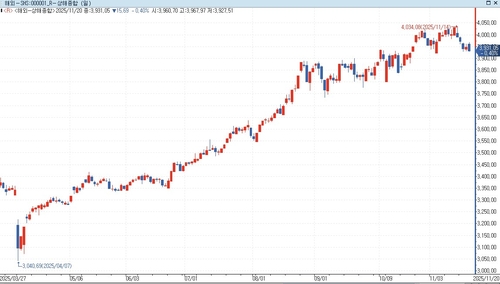
(Seoul=Yonhap Infomax) Kyung Pyo Hong – On the 20th, major Chinese stock indices closed lower, with semiconductor and technology shares declining despite Nvidia's robust earnings announcement.
According to the Yonhap Infomax Global Stock Index (Screen No. 6511), the Shanghai Composite Index ended at 3,931.05, down 15.69 points (0.40%) from the previous session.
The Shenzhen Composite Index closed at 2,454.44, a decrease of 18.90 points (0.76%).
Chinese equities faced continued risk-off sentiment this week amid concerns over high valuations in the technology sector.
Although artificial intelligence (AI)-related stocks initially rose following Nvidia's strong earnings report, gains were later erased in the Chinese market.
Chinese tech shares came under selling pressure due to weaker-than-expected earnings and profit-taking after recent rallies.
The Shanghai Composite Index has climbed approximately 18% year-to-date.
Persistent US-China technology tensions have also contributed to the weakness in tech stocks.
During a post-earnings conference call, Nvidia CEO Jensen Huang stated that the outlook for chip sales in China remains "zero," adding that the company is working to persuade both the US and Chinese governments to allow re-entry into the market.
Analysts noted that the recent strength of the US dollar is weighing on tech stock valuations and triggering capital outflows from emerging markets.
Rising geopolitical concerns between China and Japan are also cited as factors behind the market's weakness.
On the 7th, Japanese Prime Minister Sanae Takaichi told the House of Representatives that, for the first time as a sitting prime minister, a "contingency threatening Japan's survival" could allow the exercise of collective self-defense in the event of a Taiwan emergency.
Following this, Chinese diplomatic authorities issued strong criticism, and on the 15th, the Chinese Embassy in Japan posted an official WeChat message warning Chinese nationals to exercise caution when visiting Japan in the near future.
China has imposed broad-based pressure, including advising against travel and study in Japan, postponing Japanese film screenings, and recently notified Japan of a suspension of Japanese seafood imports as an additional sanction.
Conversely, real estate-related stocks rose on news that China is considering new property stimulus measures, such as mortgage subsidies, with securities and financial shares also gaining.
On the same day, China left its Loan Prime Rate (LPR)—effectively the benchmark lending rate—unchanged for the sixth consecutive month, in line with market expectations.
The People's Bank of China (PBOC) maintained the one-year LPR, the standard for general loans, at 3.0%, and the five-year LPR, the benchmark for mortgage loans, at 3.5%.
The PBOC also set a weaker yuan reference rate. The central parity rate for USD/CNY was set at 7.0905 yuan, up 0.0033 yuan (0.05%) from the previous session.
kphong@yna.co.kr
(End)
© Yonhap Infomax. All rights reserved. Unauthorized reproduction, redistribution, or use for AI training is strictly prohibited.
Copyright © Yonhap Infomax Unauthorized reproduction and redistribution prohibited.

